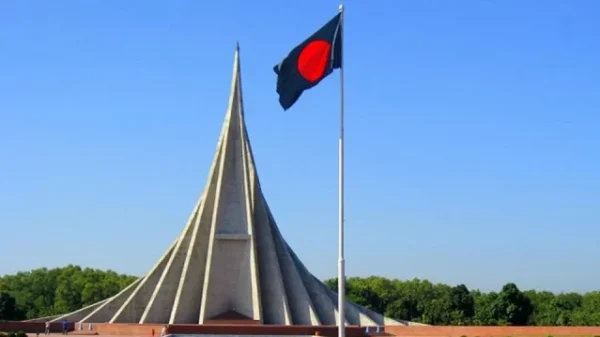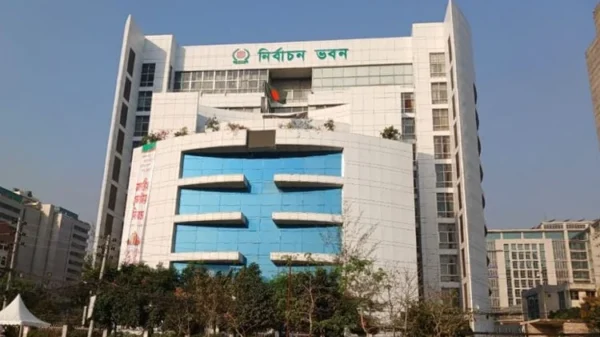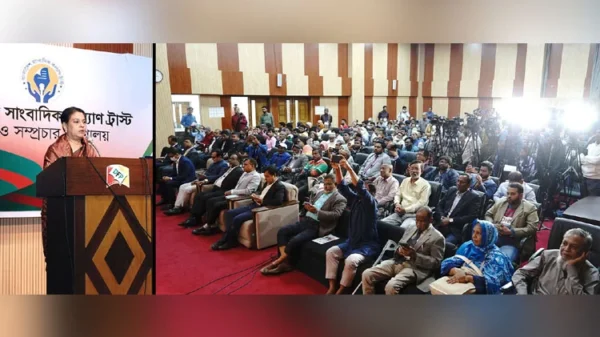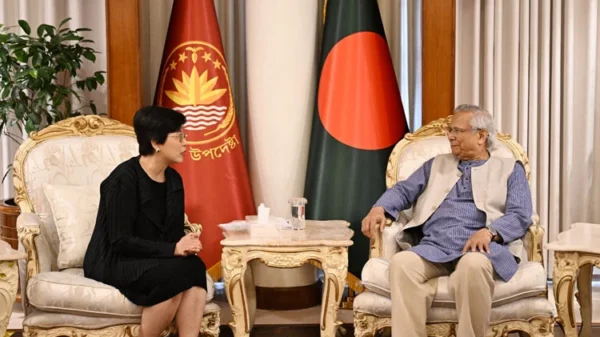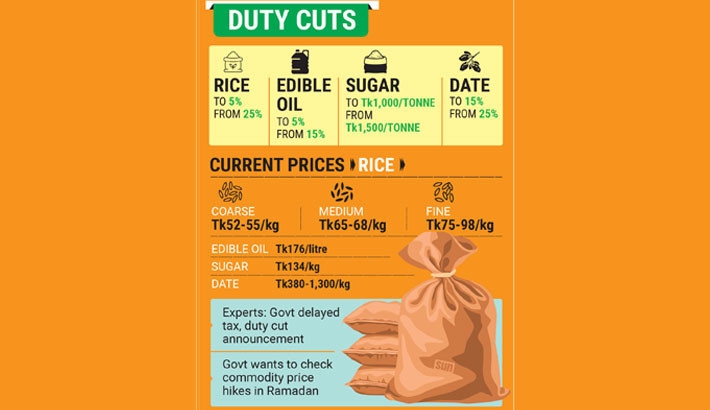Staff Reporter:
The government has announced duty-tax exemptions on four essential commodities – rice, edible oil, sugar, and dates – in an effort to prevent price hikes and alleviate the financial burden on citizens during the upcoming Ramadan.
The National Board of Revenue (NBR) issued a notification in this regard on Wednesday, which was published the following day.
The exemptions include the withdrawal of a 10% import duty on dates, a 20% regulatory duty on rice, and 5% duties on both edible oil and sugar.
Experts, however, have expressed mixed reactions regarding the effectiveness of this decision, stating that the government has delayed announcing the tax and duty cuts.
They suggest that such announcements should have been made in December to have a more significant impact on the market during Ramadan, especially considering that products like dates are imported from Middle Eastern countries, specifically Saudi Arabia, which has a longer import lead time.
They emphasise the need for an increased supply of essential commodities during Ramadan to effectively curb price hikes.
Zahid Hussain, former lead economist of the World Bank’s Dhaka office, told the Daily Sun that the government’s decision should have been made in December and expressed concern over its delayed announcement.
The initiative aimed at reducing the prices of essential products does not appear to have been successful during Ramadan, he mentioned. However, if there is a higher supply of goods during Ramadan, it may help control price increases.
Among the various products in demand during Ramadan, dates and sugar stand out as particularly important, he said, adding that importing these products on time for Ramadan has proven to be challenging.
Ghulam Rahman, president of the Consumer Association of Bangladesh (CAB), told the Daily Sun that while the government has cut taxes and duties on essential products, it is a good initiative, although the decision has been taken rather late.
He emphasised that this decision could potentially help reduce product prices during Ramadan. Rahman further noted that for the government’s decision to effectively lower taxes, the supply of products must increase to meet the heightened demand during the Ramadan period; otherwise, it will primarily benefit businessmen rather than consumers.
In the NBR notification issued on Thursday, the import duty on refined and unrefined sugar has been reduced from Tk1,500 to Tk1,000 per tonne. Additionally, there is a 15% VAT, 2% advance income tax (AIT), 3% advance tax (AT), and 30% regulatory duty (RD) on the import of raw sugar.
Refined sugar currently incurs a 15% VAT, 5% AIT, 5% AT, and 30% RD. In response to the Ministry of Commerce’s request, VAT on edible oil has been reduced from 15% to 5%.
Currently, the annual demand for edible oil is 20 lakh tonnes, with 2 lakh tonnes produced domestically and the remaining 18 lakh tonnes imported. The reduction in VAT on imported edible oil has been outlined in the new notification. This decision, effective immediately, follows a directive from Prime Minister Sheikh Hasina to ensure an uninterrupted supply of these items during Ramadan.
Given the high demand for dates during Ramadan, traders have raised concerns about the increased duty imposed on dates in the current fiscal year.
Responding to this, the Ministry of Commerce requested the National Board of Revenue to withdraw the duty. In the latest notification, the NBR has reduced the duty on the import of dates from 25% to 15%.
The country has an annual demand of around 50,000 tonnes of dates, all of which are imported from Middle Eastern countries. Dates come in different qualities, and currently, the import duty on dates stands at 25%, along with a 15% VAT, 5% AIT, 5% AT, and 3% RD.
In other adjustments, the regulatory duty (RD) on rice imports has been reduced from 25% to 5%. However, wholesale edible oil is priced at Tk176 per litre, with palm oil at Tk130 per litre in the market.
Wholesale prices for sugar currently stand at Tk134 per kg. In Dhaka, coarse rice is selling at Tk52-55 per kg, medium rice at Tk65-68 per kg, and finer rice at Tk75-98 per kg, reflecting a Tk5-7 hike per kg since February 08, as per market sources.
On the other hand, Dabbas dates are selling for Tk380, Mashrookh for Tk500, Safari for Tk800, Saudi Arabian Amber for Tk800, Nakal for Tk350, and dates on a string for Tk500 in the markets. Additionally, Folmondi and Ajwa dates are selling for Tk1,100 per kg, while the best quality Ajwa dates cost Tk1,400 per kg. Medjool dates are priced at Tk1,200 per kg, and Egyptian Amber dates cost Tk1,300 per kg.
According to data from the Chattogram Customs House, sugar imports surged to approximately 1.19 lakh tonnes from 1 October last year to 20 January this year, compared to around 80,000 tonnes in the same period a year earlier.
Similarly, crude edible oil imports reached 7.47 lakh tonnes in the last three and a half months, surpassing the 6.59 lakh tonnes from the previous season.
However, there was a notable decrease in the import of dates during this period, amounting to over 10,000 tonnes compared to 25,000 tonnes in the corresponding period last season, marking a 59.29% reduction.


